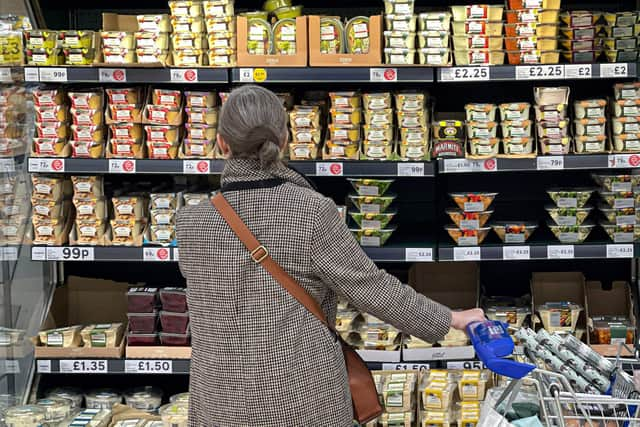Sheffield cost of living: UK inflation rate increases to 9 per cent - the highest level in more than 40 years
and live on Freeview channel 276
Consumer Prices Index inflation rose to nine per cent last month, up from an already high seven per cent in March, its highest level since comparable readings in 1982.
Data released by the Office for National Statistics (ONS) showed a large portion of the rise was due to the price cap on energy bills, which was hiked by 54 per cent for the average household at the start of April.
Advertisement
Hide AdAdvertisement
Hide AdThe figures will add to the pressure already facing households to cut back on bills and everyday spending.


Much of the jump is due to the high cost of energy on international markets, particularly gas, although oil prices have also shot up. This in turn has pushed up the price of many other items, including food, which are made or transported using gas and oil-based products, while the war in Ukraine has also hit global food supplies.
Grant Fitzner, chief economist at the ONS, said: “Inflation rose steeply in April, driven by the sharp climb in electricity and gas prices as the higher price cap came into effect.
“Around three-quarters of the increase in the annual rate this month came from utility bills.
Advertisement
Hide AdAdvertisement
Hide Ad“We have also published new modelled historical estimates today which show that CPI annual inflation was last higher 40 years ago.”
Why is inflation increasing?
In March, the Office for National Statistics (ONS) recorded inflation at seven per cent as the immediate effects of Russia’s war in Ukraine filtered through to the like of fuel forecourts.
This was on top of existing inflation caused by the easing of Covid restrictions, which saw demand outstripping supply across the global economy.
On 1 April, the average annual cost for gas and electricity rose by £693 to £1,971 for around 22 million UK households, following a price hike of 54 per cent. For customers with prepayment meters, the price cap increased by £708 to £2,017.
Advertisement
Hide AdAdvertisement
Hide AdThe price cap is based on the price of wholesale energy and supplier costs which have increased by 250 per cent since January and rose by 70 per cent in August alone.
It is currently forecast to hit almost £2,600 in total at the next adjustment which is due in October.
The Bank of England forecast earlier this month that inflation is likely to peak at 10.25 per cent later this year, with food prices set to rise even higher due to crucial supplies of products like wheat being held up because of the war in Ukraine.
It has warned that the strain could result in a recession and surge in unemployment, increasing pressure on the Chancellor to provide further relief to consumers and businesses.
Could there be a recession?
Advertisement
Hide AdAdvertisement
Hide AdThe British Chambers of Commerce warned that “unprecedented” inflation could spark a recession later in the year.
BCC head of economics Suren Thiru said: ““The scale at which inflation is damaging key drivers of UK output, including consumer spending and business investment, is unprecedented and means there is a real chance the UK will be in recession by the third quarter of the year.”
